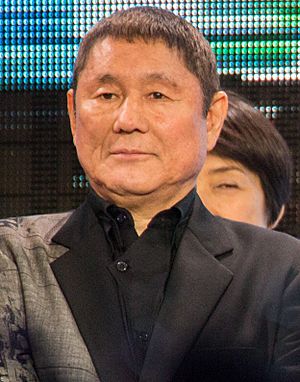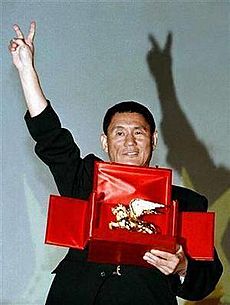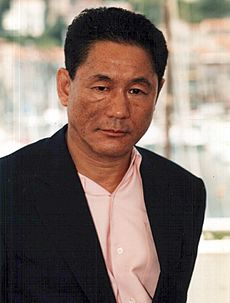Takeshi Kitano facts for kids
Quick facts for kids
Takeshi Kitano
|
|
|---|---|
| 北野武 | |

Kitano in 2017
|
|
| Born | 18 January 1947 Adachi, Tokyo, Japan
|
| Other names | Beat Takeshi (ビートたけし) |
| Occupation |
|
| Years active | 1969–present |
|
Notable work
|
Hana-bi (1997) |
| Height | 168 cm (5 ft 6 in) |
| Spouse(s) |
|
| Children |
|
| Awards | Golden Lion (1997) |
| Signature | |
 |
|
Takeshi Kitano (born January 18, 1947) is a famous Japanese comedian, actor, and filmmaker. In Japan, most people know him as a comedian and TV host named Beat Takeshi. In other parts of the world, he is more famous for the movies he has directed and acted in.
Kitano first became a comedian while he was a student at Meiji University. In 1973, he started a comedy duo called "Two Beat" with his friend Kiyoshi Kaneko. This is when he began using the stage name Beat Takeshi. Their comedy style was very popular, and they became famous on TV shows in the 1980s.
He also became known as a serious actor, especially after appearing in the 1983 movie Merry Christmas, Mr. Lawrence. In 1989, he directed his first movie, Violent Cop. He won the top prize, the Golden Lion, at the Venice Film Festival for his 1997 film Hana-bi.
Many people outside of Japan know him from the fun game show Takeshi's Castle or for his role in the 2000 movie Battle Royale. Critics have praised his unique style of filmmaking. His movies are often about police officers or Japanese gangsters called yakuza. They can be serious and have a dark view of the world, but they are also often filled with humor.
Contents
Life and Career
Early Life and Comedy Start
Takeshi Kitano was born in Adachi, Tokyo. He had two older brothers and an older sister. His father was a house painter, and his mother worked in a factory and was very strict about his education. He went to Meiji University to study engineering but left before graduating to become a comedian.
In 1972, he started working at a theater in the Asakusa district of Tokyo. There, he learned comedy from a comedian named Senzaburo Fukami.
The "Two Beat" Comedy Duo
In the 1970s, Kitano and his friend Nirō Kaneko formed a comedy duo called "Two Beat." Their style of comedy is called manzai in Japan, which involves fast-paced jokes between two performers. Kitano, as "Beat Takeshi," was the funny man, while his partner, "Beat Kiyoshi," was the straight man who reacted to the jokes.
They became very successful on TV in the late 1970s and early 1980s. Kitano's jokes were often edgier than traditional comedy. Later, Kitano decided to work by himself, and the duo split up. He became one of the "Big Three" TV comedians in Japan.
Becoming a TV Host and Actor
Kitano became a popular TV host. His show Takeshi's Castle (1986–1990) was a game show where contestants tried to complete silly and difficult physical challenges. The show became famous all over the world.
His first major movie role was in Merry Christmas, Mr. Lawrence (1983), where he played a tough sergeant in a prisoner-of-war camp during World War II. He acted alongside the famous singer David Bowie. Kitano said he was nervous about whether the audience would accept him as a serious actor. He was surprised when the audience laughed when he first appeared on screen, but it made him want to continue playing serious roles in movies.
In 1989, he was supposed to star in the movie Violent Cop. When the original director had to leave the project, the movie company suggested that Kitano direct it himself. He also rewrote the script, which marked the beginning of his career as a filmmaker.
Success as a Filmmaker
Gaining International Fame

Kitano's second film as a director was Boiling Point (1990). With this movie, he started to develop his unique style, which included long, quiet scenes, very little talking, and moments of sudden action. His third film, A Scene at the Sea (1991), was a gentler, more romantic story about a deaf garbage collector who learns to surf.
His 1993 film Sonatine was not a big hit in Japan, but critics in Europe loved it when it was shown at the 1993 Cannes Film Festival. This helped him become famous outside of Japan.
In August 1994, Kitano was in a serious motorscooter accident that injured the right side of his face. After he recovered, he took up painting. His paintings have been shown in art galleries and are even featured in some of his movies.
His most celebrated film, Hana-bi (1997), featured some of his paintings. The movie won the Golden Lion award at the 1997 Venice Film Festival. Kitano said that winning this award made people in Japan finally see him as a serious director, not just a comedian.
Major Films of the 2000s

In 2000, Kitano starred in the blockbuster movie Battle Royale. In the film, he played a teacher who oversees a group of students forced to fight each other on a deserted island.
That same year, he directed and starred in Brother, a movie filmed in Los Angeles about a Japanese gangster. In 2003, he directed and starred in Zatōichi, a new version of a classic story about a blind swordsman. The movie was a huge success in Japan and won many awards, including the Silver Lion at the Venice Film Festival.
Later Career and Recent Work
From 2005 to 2008, Kitano was a teacher at the Tokyo University of the Arts, where he taught filmmaking. He continued to direct movies, including a series of films about his own life: Takeshis' (2005), Glory to the Filmmaker! (2007), and Achilles and the Tortoise (2008).
In 2010, he released the crime film Outrage, which was followed by two sequels, Outrage Beyond (2012) and Outrage Coda (2017). These films were very successful.
In 2017, he appeared in the American movie Ghost in the Shell. More recently, he directed the samurai film Kubi, which was shown at the 2023 Cannes Film Festival.
Awards and Honors
- Golden Lion at the 54th Venice International Film Festival in 1997 for his film Hana-bi.
- Lifetime Achievement Award at the 30th Moscow International Film Festival in 2008.
- Commander of the Order of the Arts and Letters from France in 2010, a high honor for artists.
- Golden Mulberry Lifetime Achievement Award at the Far East International Film Festival in Italy in 2022.
Selected Filmography
As Director
| Year | Title | Notes |
|---|---|---|
| 1989 | Violent Cop | His first film as a director. |
| 1990 | Boiling Point | |
| 1991 | A Scene at the Sea | |
| 1993 | Sonatine | |
| 1996 | Kids Return | |
| 1997 | Hana-bi | Won the Golden Lion award. |
| 1999 | Kikujiro | |
| 2000 | Brother | |
| 2002 | Dolls | |
| 2003 | Zatōichi | A major box office success in Japan. |
| 2010 | Outrage | The first film in his Outrage trilogy. |
| 2017 | Outrage Coda | The final film in the Outrage trilogy. |
| 2023 | Kubi | A historical samurai film. |
As Actor (Selected Roles)
- Merry Christmas, Mr. Lawrence (1983)
- Violent Cop (1989)
- Sonatine (1993)
- Johnny Mnemonic (1995)
- Hana-bi (1997)
- Kikujiro (1999)
- Taboo (1999)
- Brother (2000)
- Battle Royale (2000)
- Zatoichi (2003)
- Ghost in the Shell (2017)
- Kubi (2023)
See also
 In Spanish: Takeshi Kitano para niños
In Spanish: Takeshi Kitano para niños
 | Kyle Baker |
 | Joseph Yoakum |
 | Laura Wheeler Waring |
 | Henry Ossawa Tanner |

